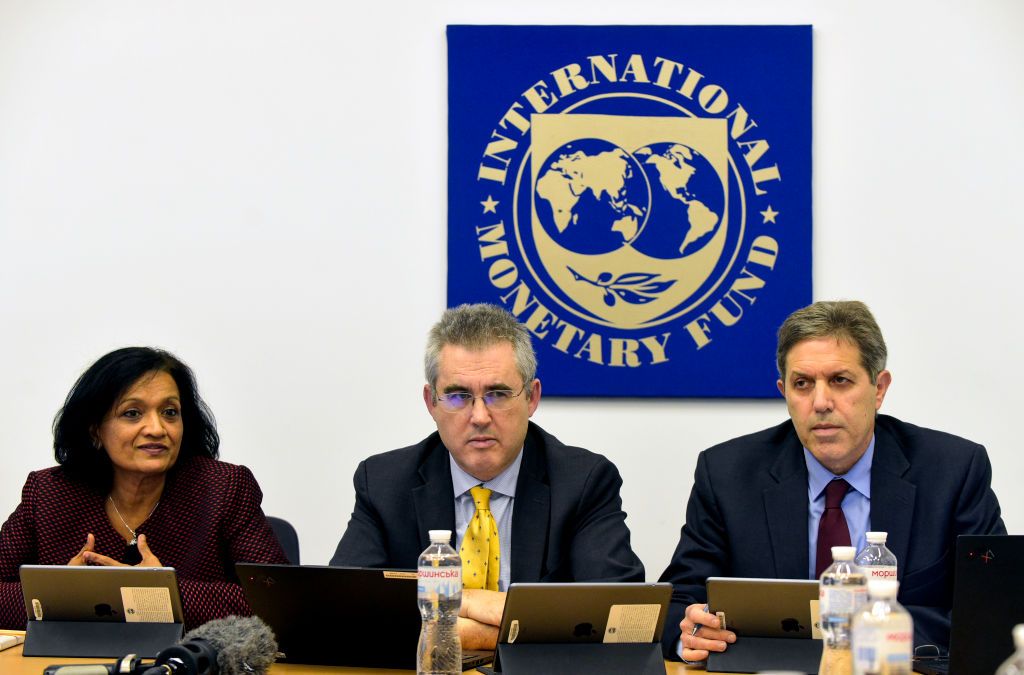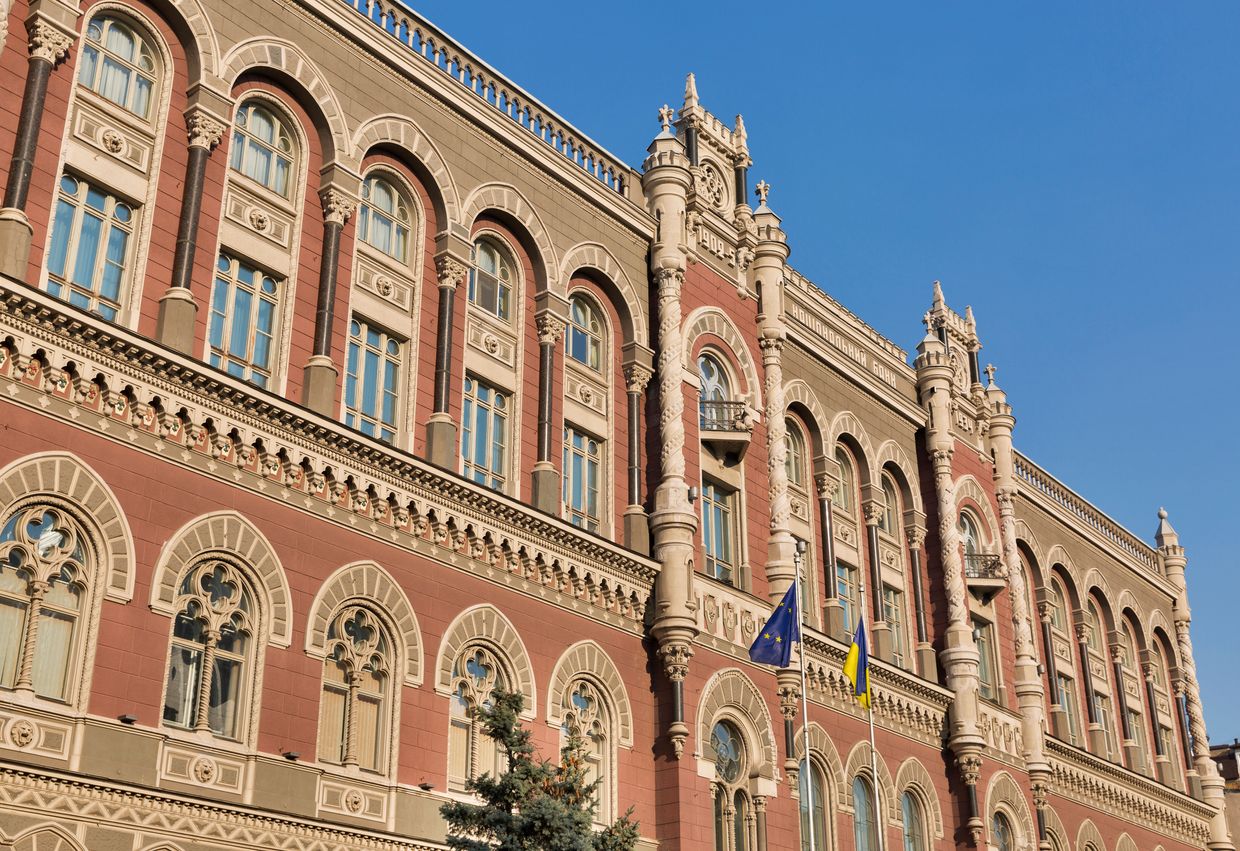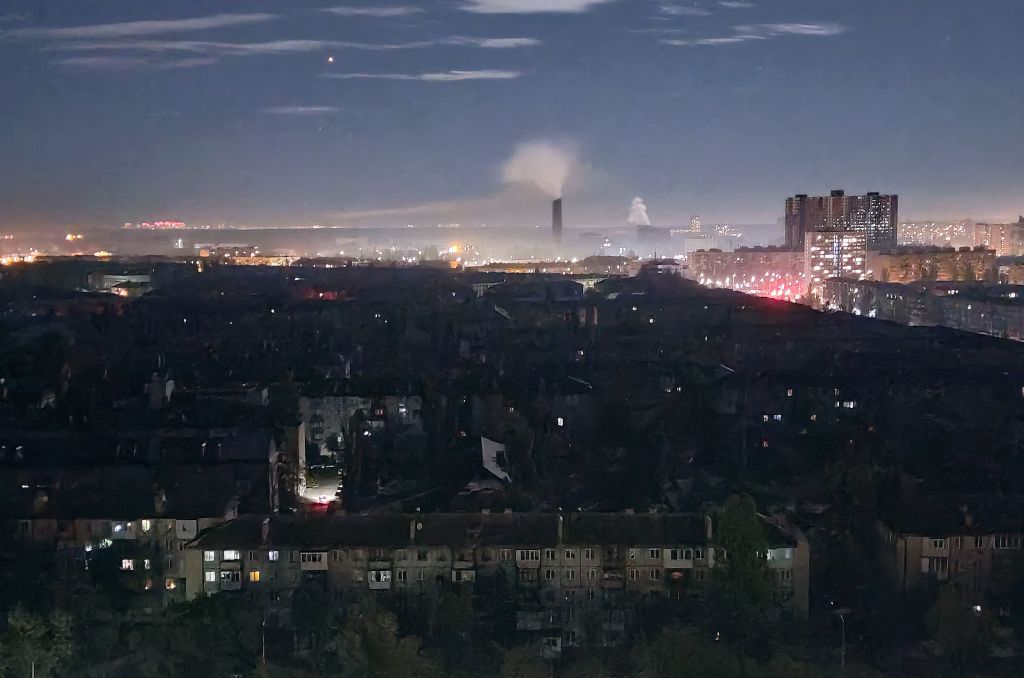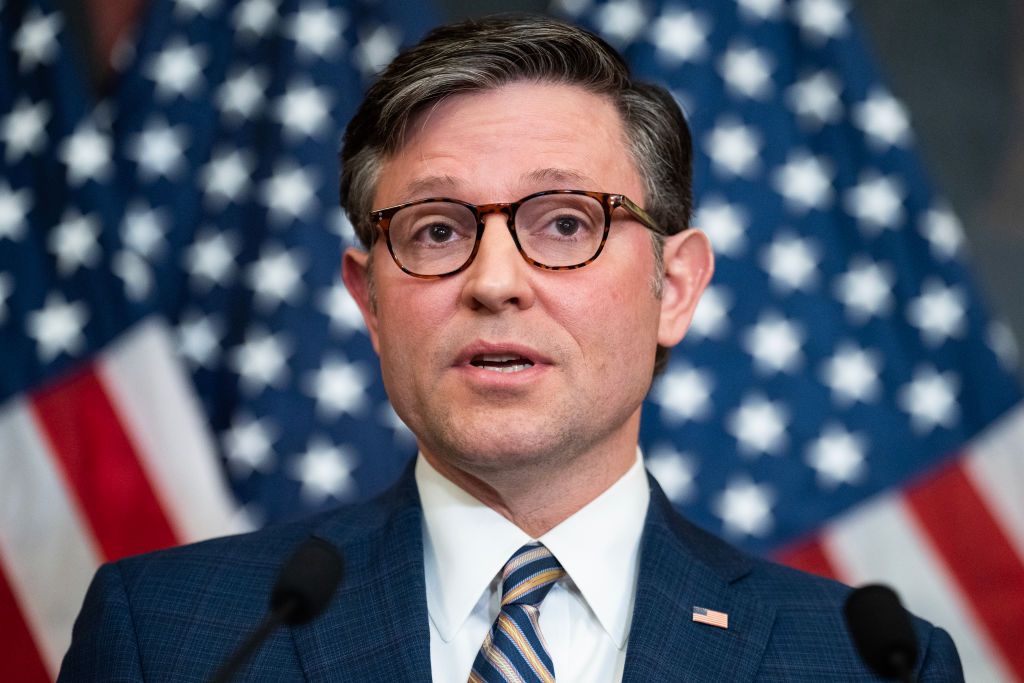Ukraine state-owned enterprises weekly — Issue 110
Editor's Note: This is issue 110 of Ukrainian State-Owned Enterprises Weekly, covering events from Nov.
3-10. The Kyiv Independent is reposting it with permission. Ukrainian SOE Weekly is an independent weekly digest based on a compilation of the most important news related to state-owned enterprises (SOEs) and state-owned banks in Ukraine.
This publication was produced with the financial support of the European Union within the project "Supporting Ukraine in rebuilding and recovery" implemented by the KSE Institute. The contents of this publication are the sole responsibility of the editorial team of the Ukrainian SOE Weekly and do not necessarily reflect the views of the European Union.
Corporate governance of SOEs
SPFU presents a concept of the Ukrainian Sovereign Wealth Fund, expecting to launch it in 2024. On Nov.
8, Oleksandr Fedoryshyn, acting head of the State Property Fund of Ukraine (SPFU), presented what the Ukrainian Sovereign Wealth Fund will look like to the Verkhovna Rada's Economic Development Committee. The concept was not publicly available at the time of writing.
According to Fedoryshyn, the sovereign fund would gradually come to include all strategic SOEs that are not subject to privatization. The fund's task would be to prepare development strategies not only for individual SOEs but entire industries. It will also look for investments to make it happen.
Fedoryshyn said that he expects to launch the Ukrainian Sovereign Wealth Fund in 2024. The SPFU is working with consultants on a draft law that defines the sovereign fund's basic principles and state assets to be included. It should be built to IMF and OECD standards and operate as a holding company with 6 to 11 sectoral subsidiaries, the SPFU said.
We are not aware what IMF standards the SPFU is referring to. When invoking the OECD standards, the SPFU may be referring to the G20/OECD Principles of Corporate Governance and/or the OECD Guidelines on Corporate Governance of State-Owned Enterprises. The OECD has no specific standards for sovereign wealth funds.
According to the SPFU, the sovereign fund's supervisory board will be responsible for appointing the Director General (CEO), approving the strategy, monitoring its implementation, and protecting the rights of the state. This suggests that the concept of the fund implies a single-man executive body - the Director General - rather than a collegiate executive body, such as an executive board.
IMF: Ukrainian economy shows signs of 'stronger-than-expected' recovery The IMF upgraded Ukraine's 2023 GDP growth to 4.5%, up from a range of 1-3% predicted in July.

The Director General would execute the roadmap to attract investments, grow value, and monitor performance.
The director will be accountable to the supervisory board. The SPFU has not offered any details on the proposed composition of the sovereign fund's supervisory board, proposed proportions of independent members and state representatives, or proposed nomination process for that board. In SOE Weekly Issue 93, we reported that the SPFU was working out plans to centralize state property management, which include setting up a sovereign wealth fund.
It would serve as a single vehicle for long-term management of state firms, include strategic assets that will be developed to generate profits, and increase wealth for future generations. For more detail, including international experience and previous plans on establishing such funds in Ukraine, see Issue 93. Candidate to head the State Property Fund announced. On Nov.
8, Davyd Arakhamia, head of the Sluha Narodu faction in parliament, wrote that the Verkhovna Rada was planning to appoint Vitaliy Koval, the Governor of Rivne Oblast, as head of the State Property Fund of Ukraine (SPFU) this week. Later, Prime Minister Denys Shmyhal formally proposed the candidacy of Koval as the new SPFU head to the Rada. According to Chesno, Vitaliy Koval has been the Governor of Rivne Oblast since 2019.
In 2020, he was a candidate for mayor of Rivne from the Sluha Narodu party. In the first round, Koval received 13.52% of the vote, taking the third place. In 2020, Koval was elected as a member of the Rivne City Council from Sluha Narodu.
Koval is also a member of the National Olympic Committee of Ukraine and the first vice president of the Greco-Roman Wrestling Federation of Ukraine. In 2006-2019, he headed and co-founded enterprises in the agricultural, transport, and construction industries: Atlant-Trans LLC, InvesttradeService LLC, RGS-Logisticgroup LLC, BBB Montazh LLC, and Sanako LLC. We are not aware if Koval has any investment banking or state property management experience.
In Issue 101, we reported that the former head of the SPFU, Rustem Umierov, stepped down to replace Oleksii Reznikov as Defense Minister on Sept.
6. As we also wrote in Issue 101, Umierov could be replaced at the SPFU by Olha Pishchanska, the former head of the Anti-Monopoly Committee (AMCU). On Sept.
5, the Verkhovna Rada approved Pishchanska's resignation from the AMCU and then replaced her by the former Donetsk Oblast Governor Pavlo Kyrylenko. Back then, Pishchanska neither confirmed nor denied the plans to appoint her as the SPFU head. According to UP's sources, Pishchanska learned about the reshuffle almost from the media and did not want to work at the SPFU.
FT: US seeks to foil Russia's zeal to become major LNG exporter
The U.S. is directly targeting Russia's ability to export liquefied natural gas (LNG) for the first time, which could disrupt global energy markets -- something Washington has so far looked to avoid, the Financial Times reported on Nov.
12.

On Sept.
5, Davyd Arakhamia confirmed that the position of the head of the SPFU remained vacant. Currently, the acting head of the SPFU is Oleksandr Fedoryshyn, who previously served as the deputy head. Deputy Minister Sobolev interviewed. Oleksii Sobolev, the Deputy Economy Minister, was interviewed by Ekonomichna Pravda (EP) this week.
We selected the key points on SOEs in the context of the EU's four-year, 50-billion-euro Ukraine Facility program. On the management of the state property:
- "The public sector is growing, also, because we are sanctioning Russian assets. We say that we need to continue privatizing companies and strengthening corporate governance.
We also need to centralize management for some of the companies that remain state-owned. We will create a fund with an independent supervisory board that will deal with this professionally. We are discussing with the IMF and the World Bank how best to do this.
Both we and the EU seem to agree that some state assets will need to be consolidated under one roof."
In Issue 93, we reported that the SPFU was working out plans to centralize state property management, which include setting up a sovereign wealth fund.
- "For companies that remain state-owned, we need to move towards attracting competition to the sectors in which they operate. That is, we need to build processes or regulations that will allow private capital to enter those markets where only the state is currently operating."
On the reduction of the public sector of the economy:
- "The reduction of the public sector is among the requirements in this plan. This is an important part because our public sector is really large."
- "We need to define strategic companies by law.
We think there will be about a hundred of them. The biggest ones are Naftogaz, Ukrzaliznytsia, Ukrenergo, and Energoatom. There are many strategic state assets in the energy sector.
The war has shown that there are not only business tasks there. There are a lot of defense companies and a lot of technical companies that perform a state function, such as Prozorro.Sale."
- "We are considering the option of foreign companies entering the capital of these strategic companies. We hope that the parliament or the government will approve a list of companies for which this can be done.
For example, it was said that a strategic investor could be found for Ukrposhta and Ukrzaliznytsia."
- "I think that corporate (governance) reform will work when people have a financial stake. That is, when there is not just an independent member of the supervisory board, but a third party that has invested a lot of money there and cares. It is important for them to see that everything is good, no corruption, and super-efficient.
That is why we divide our companies into strategic and non-strategic ones. The non-strategic ones are to be privatized. For a hundred strategic ones, the management should be consolidated."
SPFU opens a competitive selection for independent members of Demurinsky Plant's supervisory board. The search started on Nov.
2. The plant had been seized from sanctioned Russian oligarch Mikhail Shelkov. The terms and conditions of participation are available on the SPFU's website.
According to the SPFU, the supervisory board of Demurinsky, which is 100% owned by the state, will have two independent members and one state representative. The board's tenure will be three years. It is not clear why Demurinsky, which should be normally slated for immediate sale, needs a supervisory board and what its role will be.
It is also unclear from the above communications whether the SPFU plans to sell Demurinsky in the next three years. It also follows from these and earlier communications of the SPFU that this would stall the privatization of United Mining and Chemical Company (UMCC), as we discussed in Issue 109. In SOE Weekly Issue 74, we reported that on Feb.
3, the High Anti-Corruption Court (HACC) satisfied an appeal by the Justice Ministry and confiscated the Demurinsky Mining and Processing Plant formerly owned by Shelkov. In Issue 77, we reported that the Cabinet of Ministers transferred the assets of Shelkov to the SPFU, including Investagro and Demurinsky. As we wrote in Issue 109, acting head of the SPFU Oleksandr Fedoryshyn said that the SPFU's plans were to sell Demurinsky as a merged entity with another SOE, United Mining and Chemical Company (UMCC).
See more detail in Issue 109.
Banks
NBU urges state-owned banks not to invest in G7 bonds. According to EP, on Oct.
25, the National Bank of Ukraine (NBU) sent a letter to all five state-owned banks advising them to buy Ukrainian securities. "The NBU notes an increase in the number of decisions taken by state-owned banks to use free foreign currency liquidity to purchase G7 securities. The banks are not using all available opportunities to invest in instruments issued by the Finance Ministry," the letter said.
The state-owned banks had a mixed reaction, EP wrote. It is unclear whether the admonishment has any legal power. The regulator said that its letter was only a recommendation.
"The letter reflects the NBU's position on the importance of updating the strategies of state-owned banks, in particular in terms of asset and liability management policy under martial law, and the need for banks to make important investment decisions in accordance with such updated strategies," the NBU explained to EP. "The NBU's position is simple: the resources and capabilities of state-owned banks are much more important for our country's economy and should be used as efficiently as possible," the NBU also said.
Ukraine's international reserves fall for third month in a row to £38.9 billion Ukraine's international reserves fell by 1.9% in October to £38.9 billion after the government repaid debts on the foreign exchange (FX) market, the National Bank of Ukraine (NBU) announced on Nov.
7.

The NBU regulates all banks in the country, whether state-owned or private. It is therefore strange that the central bank tries to tell some of these banks - based on the fact that they are owned by the state - how to invest, EP claimed. In September 2023, Ukrainian banks purchased Hr 78 billion (about £2 billion) in bonds from Western countries.
Since the beginning of the full-scale war, the volume of such investments has increased more than 14 times. When it comes to dollar accounts, banks invest part of their funds in U.S. Treasury bills.
The interest rates on these instruments are 5.2-5.4% per annum. By investing free foreign currency liquidity in U.S. government bonds, the bank can offer its customers more favorable terms for servicing foreign currency deposits. Therefore, if state-owned banks refrain from such investments, this may give their private counterparts a competitive advantage, EP wrote.
The media also pointed out that although Ukrainian banks' (except state-owned banks') investments in foreign bonds have been growing at an unprecedented rate, they do not come near the NBU itself who is, in fact, Ukraine's largest investor in such securities. Most of the NBU's foreign exchange reserves are held in the form of securities. On Nov.
1, the NBU held over £26.2 billion in these instruments. Most of these securities are U.S. government bonds, EP claimed.
Energy sector
Ukrainian Distribution Networks gets state shares in five electricity distributors. On Nov.
6, the Energy Ministry reported that Ukrainian Distribution Networks acquired the rights of a shareholder of state-owned stakes in five more distribution system operators (oblenergos): Zaporizhzhyaoblenergo, Ternopiloblenergo, Cherkasyoblenergo, Kharkivoblenergo, and Sumyoblenergo. Ukrainian Distribution Networks now manages state shares in seven oblenergos in different regions of the country.
At the time of establishment in November 2022, the company included Khmelnytskoblenergo and Mykolaivoblenergo. According to observers, the consolidation of state-owned oblenergos into a single state holding company was initiated by Rostyslav Shurma, deputy head of the Presidential Office. Before that, these oblenergos were being prepared for privatization.
Observers also noted that now Ukrainian Distribution Networks is the second largest player in the country's electricity distribution market after Rinat Akhmetov's DTEK Merezhi. The electricity market has a chain of debts of "everyone to everyone" worth Hr 60 billion (£1.6 billion). According to EP and Forbes Ukraine, a chain of debts of "everyone to everyone" has formed in the electricity market. At the end of October, this amounted to tens of billions of hryvnias.
The list of debtors and creditors includes all the major players, including SOEs: Energoatom, Ukrenergo, Guaranteed Buyer, and Centrenergo. According to EP, there are three sources of these debts, as discussed below. The first source is public service obligations (PSOs). According to EP and Forbes Ukraine, the structure of debts is as follows: Energoatom underpaid Guaranteed Buyer, which underpaid universal service providers (companies that supply electricity to households, also known as public utility companies), which underpaid Ukrenergo and distribution system operators (former oblenergos), and the latter underpaid Ukrenergo.
Energoatom and Ukrhydroenergo were granted the right to sell electricity on market terms from Oct.
1, 2021. Under the new PSO's financial model, the proceeds were used to compensate electricity providers for the difference between the regulated household tariffs (Hr 1.44/kWh and Hr 1.68/kWh depending on the volume of consumption) and market prices. Since October 2021, the Cabinet of Ministers has repeatedly extended the PSO mechanism to keep electricity tariffs for households unchanged.
The PSO mechanism was in place until April 30 - the price of electricity for households remained unchanged until the end of the previous heating season. On May 30, the Cabinet of Ministers approved an increase in the electricity tariff for households to Hr 2.64/kWh from June 1. As we wrote in Issue 109, after accumulating large debts due to losing the Zaporizhzhia Nuclear Power Plant, Energoatom is able to fulfill all PSOs again since September 2023.
As of Oct.
24, Energoatom had covered 76% of the cost of delivering affordable electricity to households, equivalent to Hr 9 billion (£250 million). The September PSO costs, Hr 8.4 billion (£233 million), were paid in full. Energoatom also repaid Hr 2.1 billion (£58 million) in debts in September and again in October.
However, according to Energoatom's CEO Petro Kotin, Energoatom's debt would remain at Hr 17 billion (£472 million) by the end of 2023. To close the gap, Energoatom called on the government to allocate Hr 34.9 billion (£970 million) from the 2024 budget to compensate the company for the costs of maintaining low tariffs for households. However, no money for subsidies to Energoatom is provided for in either 2023 or 2024 state budget, the Energy Minister Herman Halushchenko told Forbes Ukraine. "All the money goes to the war," the minister said.
A second source of the debts is the "green" PSO, EP added. There is an intermediary between large producers of renewable electricity and its buyers - the Guaranteed Buyer - which buys "green" electricity and sells it on the open market. The problem is that the Guaranteed Buyer earns only a fraction of the money needed to pay renewable energy producers.
The rest should be compensated by Ukrenergo from the electricity transmission tariff. However, Ukrenergo lacks funds because other market participants do not pay, EP explained. According to EP, Ukrenergo's debt to the Guaranteed Buyer under the feed-in tariff is Hr 29.9 billion (£831 million).
As a result, in 2023, renewable electricity producers are paid about 50% of the required amount. According to Ukrenergo's CEO Volodymyr Kudrytskyi, the only source of funds for the compensation of the "green" tariff is the transmission tariff, which must be paid by companies supplying electricity to households, regional electricity distributors, water utilities, and coal mines, Forbes Ukraine wrote. In his earlier interview for BusinessCensor, Kudrytskyi said that Ukrenergo's tariff should be increased, and market participants should pay on time, in order to prevent the accumulation of debts.
Energy Ministry: Russian attacks on energy infrastructure impact 6 oblasts, thousands without power
Russian attacks hit energy infrastructure in several locations in Ukraine, leaving thousands without power in six different oblasts, Ukraine's Energy Ministry said on Nov.
11.

Ukrenergo's tariff is set by the National Energy and Utilities Regulatory Commission (NEURC), which does not agree that it is unprofitable for the company, Forbes Ukraine added. The solution to the debt problem lies in Ukrenergo's effective claims and lawsuits to recover debts, not in the tariff, the regulator said in its statement. The third source of debts is the balancing market, EP said.
The media explained that this is the market for companies that have not been able to accurately forecast their own electricity generation or consumption. Those who failed to sell some of their electricity on the regular market will sell it at a much lower price on the balancing market, while those who bought less than they needed will have to buy it at a much higher price. This is why the balancing market is also called a financial sanction market or punitive market, EP added.
According to Yuriy Boyko, an adviser to the Prime Minister, there are many consumers in the balancing market who do not pay - the supplier of last resort (SoLR) Ukrinterenergo is among them. Consumers who have not bought electricity elsewhere are automatically assigned to the SoLR. Previously, it was possible to stay with such a supplier for no longer than 90 days, but the Energy Ministry lifted this restriction during martial law.
This is a legal way to consume electricity without paying for it, Boyko said. According to him, Ukrinterenergo's largest debtors are state-owned coal mines, water utilities, and regional electricity distributors. If the consumer does not pay the SoLR, the latter does not pay Ukrenergo.
As a result, the debt owed to Ukrenergo on the balancing market exceeds Hr 27 billion (£750 million), and the company itself owes Hr 16 billion (£444 million), EP added. Experts and market participants interviewed by EP claim that there is no simple solution. According to EP's source in the Cabinet, solving the problem requires unpopular decisions by the Energy Ministry, NEURC, the Cabinet, and improved payment discipline of power generating companies, consumers, suppliers, and exporters.
"It is necessary to look at the economics of Energoatom, determine its ability to fulfill its PSOs, and review the decisions of the Energy Ministry that allow some consumers not to pay. Ukrenergo should work with debtors, and the Cabinet should revise the tariff for households," EP's source added. "I have a feeling that nobody really wants to deal with debts right now," EP's source also claimed.
Defense
Smetanin, CEO of UDI, interviewed. Herman Smetanin, the CEO of Ukrainian Defense Industry (UDI), was interviewed by EP this week.
We selected the key points. On his appointment:
- "During martial law, competitive selections were cancelled. The first person I had a job interview with was Oleksandr Kamyshin, the Strategic Industries Minister, because this is his area of competence.
Then there were a number of interviews, including one with the president."
- "The president set the task of reforming Ukroboronprom, fighting corruption and, most importantly, increasing the production of equipment and weapons."
As we wrote in Issue 95, in June 2023, Ukroboronprom was officially transformed into a joint-stock company called Ukrainian Defence Industry (UDI). As we also reported in Issue 95, Ukroboronprom's CEO Yuriy Husiev resigned, and the Cabinet of Ministers appointed Herman Smetanin as the CEO of newly established UDI. See Issue 95 for more detail.
On weapons production:
- "We have contracts with the Defense Ministry with clear delivery schedules, and the Defense Ministry receives a request from the General Staff, which knows exactly what the Armed Forces need. Our first priority is ammunition, the second is drones, and the third is armored vehicles. And, of course, ATGMs and air defense."
- "We have managed to meet the production plan.
We are ready to produce even more weapons, so we are waiting for new contracts. In terms of volumes, we will increase production by 62% in the four quarters of 2023 compared to 2022."
- "A kamikaze drone capable of flying 1,000 km is being mass-produced, in particular, in cooperation with foreign partners. I won't tell you where exactly - for security reasons.
The main thing is that they fly and explode, and the Defense Forces order them."
How Russia's homegrown Lancet drone became so feared in Ukraine In the bubble of pro-Ukraine communities on the Internet, the constant inflow of battlefield videos showing the destruction of Russian equipment regularly lifts the moods of hundreds of thousands of supporters of Ukraine's struggle around the world. Wander over to the Russian side of the internet,...

As we wrote in Issue 94, in June 2023, Ukroboronprom reported successful use of a Ukraine-produced drone with a 1,000 km range.
- "There are many state and private manufacturers in Ukraine.
We do have a drone similar to the Shahed (an Iranian-made drone used by the Russian troops - SOE Weekly), but we also have more powerful models, because the Shahed does not fly that far. We have focused on producing more complex and expensive models, with higher performance."
- "The Armed Forces need a lot of FPV drones. We help private companies to scale their developments.
We have signed licence agreements with three large companies to produce their models. We have people and premises; we have components delivered to us; and we produce."
- "We successfully produce mortar, artillery, and tank shells in cooperation with foreign partners. Our production facilities are located in Ukraine and abroad."
- "There is ammunition production in Ukraine, but it is not ours, and it is not enough to cover the needs of the Armed Forces.
In 2024, the state budget will allocate seven times more funds for the development, modernization, and growth of the defense industry than this year. Part of this money will be used to develop ammunition production capabilities."
On the corporatization of Ukroboronprom:
- "Twenty-eight of our enterprises have already been transformed into business companies, and another seven are in the process of transformation. A major achievement of recent months is the creation of the joint-stock company UDI on the basis of the state-owned Ukroboronprom and the issue of its shares, which are owned by the state."
- "(Ukroboronprom as a) concern could not create joint ventures with Western partners or exchange technologies.
The joint venture with Germany's Rheinmetall became possible only after Ukroboronprom was transformed into a joint-stock company."
As we wrote in Issue 108, UDI reported that it has established a joint venture with one of the world's leading defence companies, German Rheinmetall AG. See Issue 108 for more detail.
- "Supervisory boards are currently being formed at Ukroboronprom and its enterprises. As the CEO of the company, I am not directly involved in this process.
In the case of Ukroboronprom, this should be done by the Cabinet of Ministers, and in the case of specific enterprises - by Ukroboronprom's newly elected supervisory board."
- "In other words, the creation of supervisory boards at enterprises will be the next step after establishing the supervisory board of Ukroboronprom. We hope that they will be elected by the end of the year."
- "If a foreigner is willing to participate in the competitive selection (for the supervisory board) and meets the criteria established by law, his or her candidacy will be considered. At least one-third of the supervisory board must be made up of independent members.
However, according to the law, a foreigner can only be a state representative on the supervisory board, not an independent member."
Privatization
SPFU plans to privatize AEROC, previously owned by sanctioned Russian oligarch Molchanov. On Nov.
7, the State Property Fund of Ukraine (SPFU) announced that it took over the company on Nov.
2 after it was seized from Andrey Molchanov's LSR Group. It is on the list of large-scale assets to be privatized in 2024. AEROC makes aerated concrete blocks in Obukhiv and Berezan, though all production stopped in July 2022.
Another plant is under construction in Stryi in Lviv Oblast. Before the sale, the SPFU wants to "do a full inventory, restart production, and improve investment attractiveness." In SOE Weekly Issue 97, we reported that the Justice Ministry filed a lawsuit with the High Anti-Corruption Court (HACC) to seize Molchanov's assets in early July.
As we reported in Issue 100, the HACC ruled to seize these assets in late August. In Issue 106, we reported that in October, the HACC's Appeals Chamber confirmed the legality of the decision to seize AEROC. SPFU fails to sell its majority stake in Rivne Radio Engineering Plant. According to Prozzoro.Sale, the first auction to try to sell the state stake of 50% + 1 share in the Rivne Radio Engineering Plant, scheduled for Nov.
7 was not held due to the absence of bidders. The starting price was Hr 121.6 million (£3.4 million). There was no public comment from the SPFU at the time of writing.
As we reported in Issue 108, the SPFU announced an auction to sell its stake of 50% + 1 share in the Rivne Radio Engineering Plant on Oct.
20.
Explaining Polish trucker protests at Ukrainian border Polish truckers are blocking three border crossings with Ukraine, protesting the unrestricted access for Ukrainian truck drivers entering Poland. The blockade has caused major delays for cargo carriers and threatens Polish-Ukrainian relations.

Privatization revenues are 73 million euros since the beginning of the year, less than half of the 2023 plan. On Nov.
8, the SPFU reported that it has generated a revenue of Hr 6.2 billion (£172 million) since the beginning of 2023. This includes proceeds from privatization (including VAT paid by buyers), leasing, and SOE dividends and taxes. The SPFU attracted the most funds from privatization - Hr 2.92 billion (£81 million).
Privatization auction winners also paid Hr 500 million (£13 million) in VAT. The SPFU also said that it has received Hr 600 million (£16 million) from the lease of state assets since the beginning of 2023. The enterprises managed by the SPFU paid Hr 2.12 billion (£58 million) in dividends and taxes since the beginning of the year.
As we wrote in Issue 105, SPFU reported that in January-September 2023, the state budget received Hr 2.7 billion (£75 million) from privatization. In Issue 96, we reported that SPFU raised Hr 1.82 billion (£50 million) from privatization auctions in the first half of 2023. This suggests that privatization yielded about Hr 900 million (£25 million) in the third quarter.
The 2023 annual revenue from privatization to the state budget was projected to be Hr 6 billion (£166 million) This amount would represent 0.45% - that is, less than half per cent - of the total state budget revenues planned for 2023. The privatization proceeds in the first nine months, Hr 2.7 billion (£75 million), are responsible for 0.2% of the total budget revenues planned for 2023. As we wrote in Issue 109, the SPFU plans to put up for privatization almost 200 more assets with an estimated book value of over Hr 1.36 billion (£37 million).
AP: Proposed US funding bill excludes Ukraine aid as political battle looms
U.S.
House Speaker Mike Johnson revealed on Nov.
11 a new proposal to keep the federal government open, a plan which excludes additional funding for Ukraine, AP reported.
